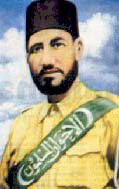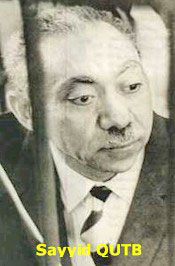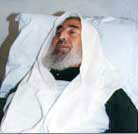|


from
HomeLandSecurityUS Website
“Allah is our objective. The Prophet is our leader. Qur'an is our
law. Jihad is our way. Dying in the way of Allah is our highest
hope.”
Motto of the Muslim Brotherhood
The Muslim Brotherhood began was founded in Egypt in
1928 by Hassan
al BANNA as a youth organization with the primary objectives of
moral and social reform throughout Islam. The movement extended to
Syria where one branch founded in 1935 (the Aleppo branch) became
the Syrian headquarters of the Muslim Brotherhood. The organization
then expanded its
 social-political involvement and became the known
as the Party of the Muslim Brotherhood, Hizb Al-Ikhwan Al-Muslimoon.
Al-BANNA was a devout admirer of Adolf Hitler when he was a writer
and before his rise to power. Al BANNA wrote supportive letters to
Hitler and as a result, Hitler's requested that Nazi intelligence
contact AL BANNA for the purpose of working together. Hitler
enlisted Al-BANNA to establish a spy network for Nazi Germany
throughout the Arabian Peninsula. The Nazi-Muslim alliance became
such that Al-BANNA promised Hitler that when the Nazi's arrived
Cairo and Alexandria, the Muslim Brotherhood would ensure that all
of the British troops would be killed. social-political involvement and became the known
as the Party of the Muslim Brotherhood, Hizb Al-Ikhwan Al-Muslimoon.
Al-BANNA was a devout admirer of Adolf Hitler when he was a writer
and before his rise to power. Al BANNA wrote supportive letters to
Hitler and as a result, Hitler's requested that Nazi intelligence
contact AL BANNA for the purpose of working together. Hitler
enlisted Al-BANNA to establish a spy network for Nazi Germany
throughout the Arabian Peninsula. The Nazi-Muslim alliance became
such that Al-BANNA promised Hitler that when the Nazi's arrived
Cairo and Alexandria, the Muslim Brotherhood would ensure that all
of the British troops would be killed.
The decade of the 1930's saw the rise of the Muslim Brotherhood as a
political group; it became an official political organization in
1939.
In 1942, Hassan al BANNA established additional branches of the
Muslim Brotherhood in Transjordan and Palestine and moved the
Syrian
headquarters to Damascus in 1944. In Egypt after the end of World
War II, Egyptian members took violent action against King Farouk’s
government, leading to the expulsion of the organization from Egypt.
It's members moved to moved to Transjordan where many more
participated in the Arab-Israeli War of 1948-1949, fighting against
the Jewish occupiers.
On December 28, 1948, a member of the Muslim Brotherhood
assassinated Egyptian Prime Minister Mahmud Fahmi Nokrashi.
Consequently, the Muslim Brotherhood was banned and Al BANNA was
later killed by government agents in Cairo in February 1949.
On October 26, 1954, a member of the Muslim Brotherhood, Abdul Munim
Abdul Rauf, attempted to kill Egypt's second president Gamal Abdul
Nasser . As a result, the organization was outlawed again and over
4000 of its members were imprisoned, including
 prominent member
Sayyid QUTB, who became the most influential intellectual of the
group, writing books in prison much like Hitler did before his rise
to power. Members of the Muslim Brotherhood expanded their ranks to
Jordan, Lebanon, Saudi Arabia, and Syria. The organization also
opposed the growing alliance between Egypt and Communist USSR at
that time. prominent member
Sayyid QUTB, who became the most influential intellectual of the
group, writing books in prison much like Hitler did before his rise
to power. Members of the Muslim Brotherhood expanded their ranks to
Jordan, Lebanon, Saudi Arabia, and Syria. The organization also
opposed the growing alliance between Egypt and Communist USSR at
that time.
In the 1950s, Jordanian members of the Muslim Brotherhood supported
King Hussein of Jordan and against Egypt's Gamal Nasser's attempts
to overthrow him. King Hussein banned all political parties in
Jordan in 1957 with the exception of the Muslim Brotherhood. When
Syria joined Egypt in the United Arab Republic (UAR) in 1958, the
Muslim Brotherhood went underground; when Syria left the UAR 1961,
the Muslim Brotherhood won 10 seats in the following next elections
until the Ba’th coup in 1963 forced them underground once more.
Egyptian President Nasser legalized the Muslim Brotherhood again in
1964 and released all of the prisoners being held in Egyptian
prisons. After more assassination attempts were made again against
him, however, NASSER had many Brotherhood leaders imprisoned and
others executed in 1966. Nasser's successor, Anwar SADAT, promised
that he would implement Sharia Law in Egypt. Sadat's peace treaty
with Israel in 1979, however, angered the Muslim Brotherhood once
again and led to Sadat's assassination in 1981.
The Muslim Brotherhood was angered with the appointment of Hafez al-ASSAD,
an Alawite Muslim, as the Syrian president in 1971 because the
majority of Muslims did not consider Alawites true Muslims. ASSAD
attempted to work peacefully with the organization, but his support
of Maronites in the Lebanese Civil War made the Muslim Brotherhood
declare its jihad against the proliferation of people and
organizations opposing their views. An increase in terrorist strikes
was noted; in 1979, the Muslim Brotherhood was responsible for
killing 83 Alawite cadets in the Aleppo artillery school. Meanwhile,
ASSAD tried to placate the Muslim Brotherhood by changing regime
officials and releasing political prisoners. When such changes were
deemed ineffective, military force was used to restore order.
On 25 June 1980, an assassination attempt was made against ASSAD. As
a result, ASSAD had the Syrian parliament declare membership with
the Muslim Brotherhood a capital offense and sent his army to root
out its members. In the operation that lasted through February 1982,
the Syrian army killed many of the Muslim Brotherhood in an event
that has become known as the Hama Massacre. As a result, the Syrian
branch members of the Muslim Brotherhood dispersed and joined
Islamic organizations in other countries.
In Saudi Arabia, the Muslim Brotherhood convinced King Ibn Saud to
let them start the Islamic University in Medina in 1961. Following
the 1967 Six-Day War, the Muslim Brotherhood splintered into
moderates and radicals components, with the radicals joining in
Syria and declaring jihad against the Ba'th party leaders. King
Hussein allowed the Jordanian branch
 to give military training to
Muslim Brotherhood rebels in Jordan. to give military training to
Muslim Brotherhood rebels in Jordan.
In 1973, the Israeli government permitted local Islamic leader Ahmad YASSIN to run social, religious and welfare institutions for
Palestinian Muslims. This process lasted for nearly a decade; in
1983, YASSIN was arrested for illegal possession of firearms and
sentenced to prison. He served two years and was released 1985. upon
his release, he became a folk hero of the Muslim Brotherhood and
became one of the founders of the terrorist group HAMAS following
the 1987 Intifada.
The Muslim Brotherhood was partially accepted in Egypt in 1984 as a
"religious organization," but was placed under surveillance by the
Egyptian intelligence Services. In 1989, the Muslim Brotherhood
political wing in Jordan, known as the Islamic Action Front, won 23
out of 80 seats in Jordan's parliament. Although King Hussein tried
to limit their influence though election law reformation, they
became the largest group in the parliament with the 1993 elections.
Importantly, they strongly opposed the Jordanian-Israeli Peace
Treaty in 1994.
At the onset of the Soviet-Afghan war, the Muslim Brotherhood was a
constituent part of the Afghan resistance.
More recently, The Muslim Brotherhood is suspected as being behind
the the ongoing Chechen revolt against Russia. Officials of the
Russian Intelligence services have accused the Muslim Brotherhood of
planning the homicide car bombing in Grozny, Chechnya on 27 December
2002.
Numerous Islamic terrorist organizations, including al Qaeda, have
their roots in The Muslim Brotherhood.
|

 social-political involvement and became the known
as the Party of the Muslim Brotherhood, Hizb Al-Ikhwan Al-Muslimoon.
Al-BANNA was a devout admirer of Adolf Hitler when he was a writer
and before his rise to power. Al BANNA wrote supportive letters to
Hitler and as a result, Hitler's requested that Nazi intelligence
contact AL BANNA for the purpose of working together. Hitler
enlisted Al-BANNA to establish a spy network for Nazi Germany
throughout the Arabian Peninsula. The Nazi-Muslim alliance became
such that Al-BANNA promised Hitler that when the Nazi's arrived
Cairo and Alexandria, the Muslim Brotherhood would ensure that all
of the British troops would be killed.
social-political involvement and became the known
as the Party of the Muslim Brotherhood, Hizb Al-Ikhwan Al-Muslimoon.
Al-BANNA was a devout admirer of Adolf Hitler when he was a writer
and before his rise to power. Al BANNA wrote supportive letters to
Hitler and as a result, Hitler's requested that Nazi intelligence
contact AL BANNA for the purpose of working together. Hitler
enlisted Al-BANNA to establish a spy network for Nazi Germany
throughout the Arabian Peninsula. The Nazi-Muslim alliance became
such that Al-BANNA promised Hitler that when the Nazi's arrived
Cairo and Alexandria, the Muslim Brotherhood would ensure that all
of the British troops would be killed.  prominent member
Sayyid QUTB, who became the most influential intellectual of the
group, writing books in prison much like Hitler did before his rise
to power. Members of the Muslim Brotherhood expanded their ranks to
Jordan, Lebanon, Saudi Arabia, and Syria. The organization also
opposed the growing alliance between Egypt and Communist USSR at
that time.
prominent member
Sayyid QUTB, who became the most influential intellectual of the
group, writing books in prison much like Hitler did before his rise
to power. Members of the Muslim Brotherhood expanded their ranks to
Jordan, Lebanon, Saudi Arabia, and Syria. The organization also
opposed the growing alliance between Egypt and Communist USSR at
that time.  to give military training to
Muslim Brotherhood rebels in Jordan.
to give military training to
Muslim Brotherhood rebels in Jordan.